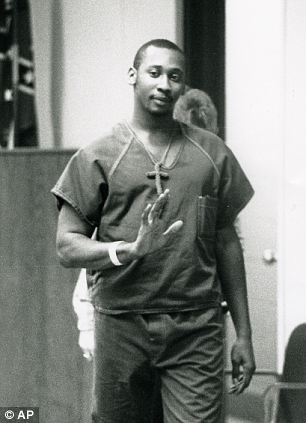
Troy Davis’s request for a polygraph test to try to prove his innocence ahead of tonight’s planned execution has been denied by Georgia Department of Corrections.
Defense lawyer Stephen Marsh said he had hoped the lie detector test would convince the state pardons board to reconsider a decision against clemency, which was rejected yesterday.
Troy Davis’ execution is scheduled for 7pm tonight. It is the fourth time in four years that Troy Davis‘ execution has been scheduled by Georgia officials.

Troy Davis, 42, has long claimed he is innocent of killing Mark MacPhail, an off-duty police officer working as a security guard in Savannah, Georgia in 1989. But state and federal courts have repeatedly upheld his conviction.
Prosecutors and Mark MacPhail’s relatives say they have no doubt the right man is being punished.
Yesterday, Georgia’s pardons board rejected the clemency plea despite high-profile support from figures including Pope Benedict XVI and a former FBI director for the claim that he was wrongly convicted.
The board did not elaborate on the decision in its written official response to the clemency application.
The decision appeared to leave Troy Davis with little chance of avoiding the execution date.
Troy Davis will be executed by injection at 7pm tonight for the August 1989 murder of Mark MacPhail, a 27-year-old off-duty police officer who was working as a security guard in Savannah when he was shot dead rushing to help a homeless man who had been attacked.
Troy Davis didn’t want a special last meal, but he planned to spend his final hours meeting with friends, family and supporters. According to an advocate who met with him late Tuesday, Davis was upbeat, prayerful and expected last-minute wrangling by attorneys.
“He doesn’t want to spend three hours away from his family on what could be the last day of his life if it won’t make any difference,” advocate said.
Troy Davis’ lawyers have long argued he was a victim of mistaken identity. But prosecutors say they have no doubt that they charged the right person with the crime.
Spencer Lawton, the district attorney who secured Troy Davis’ conviction in 1991, said he was embarrassed for the judicial system that the execution has taken so long.
“What we have had is a manufactured appearance of doubt which has taken on the quality of legitimate doubt itself. And all of it is exquisitely unfair,” said Spencer Lawton, who retired as Chatham County’s head prosecutor in 2008.
“The good news is we live in a civilized society where questions like this are decided based on fact in open and transparent courts of law, and not on street corners.”
Troy Davis case has captured worldwide attention because of the doubt his supporters have raised over whether he killed Mark MacPhail, who was shot to death after coming to the aid of Larry Young, a homeless man who was pistol-whipped in a Burger King parking lot.
Prosecutors say Troy Davis was with another man who was demanding that Larry Young give him a beer when Davis pulled out a handgun and bashed Young with it. When Mark MacPhail arrived to help, they say Troy Davis had a smirk on his face as he shot the officer to death.
Witnesses placed Troy Davis at the crime scene and identified him as the shooter. Shell casings were linked to an earlier shooting that Troy Davis was convicted of. There was no other physical evidence. No blood or DNA tied Troy Davis to the crime and the weapon was never found.
Troy Davis’ attorneys say seven of nine key witnesses who testified at his trial have disputed all or parts of their testimony.
The state initially planned to execute him in July 2007 but the pardons board granted him a stay less than 24 hours before he was to die. The U.S. Supreme Court stepped in a year later and halted the lethal injection two hours before he was to be executed. And a federal appeals court halted another planned execution a few months later.
The U.S. Supreme Court granted Troy Davis a hearing to prove his innocence, the first time it had done so for a death row inmate in at least 50 years.
At the June 2010 hearing, two witnesses testified that they falsely incriminated Troy Davis at his trial when they said Davis confessed to the killing. Two others told the judge the man with Troy Davis that night later said he shot Mark MacPhail.
Prosecutors, though, argued that Troy Davis’ lawyers were simply rehashing old testimony that had already been rejected by a jury. And they said no trial court could ever consider the hearsay from the other witnesses who blamed the other man for the crime.
U.S. District Judge William T. Moore Jr. sided with them. He said the evidence presented at the hearing wasn’t nearly enough to prove Troy Davis is innocent and validate his request for a new trial. He said while Davis’ “new evidence casts some additional, minimal doubt on his conviction, it is largely smoke and mirrors.”